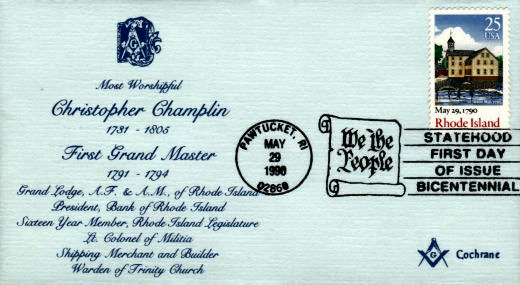![]()
Postal History Introduction
Stampless
Covers
1846
to 1900 Issues
1901-1950
Issues
1951-2003
Issues
Cancels
&
Miscellaneous
Postal
Stationery
Post
Cards
Air
Mail
First
Day &
Event Covers
Parcel Post/Special Delivery
Registered & Official Mail
Commercial & Advertising
Revenue & Postage Due
Wildlife & Game Issues
Complete List of RI Issues
|
Rhode Island First
Day of Issue Covers |
|
|
|
|
Masonic Cachet by Cochrane - Honors Christopher Champlin |
|
|
Christopher Champlin, Jr. was born on February 7, 1731 in Charlestown, (Westerly Township) Rhode Island to Colonel Christopher Champlin and Hannah Hill Champlin. While still young, Christopher moved with his parents to Newport, Rhode Island where he was admitted to membership in Saint John's Lodge Number 1 on December 21, 1758. Christopher remained an ardent and faithful supporter of Freemasonry for the rest of his days. In 1791, Saint John's Lodge Number 1 of Newport and Saint John's Lodge of Providence organized Grand Lodge of Rhode Island and Christopher Champlin was chosen as First Grand Master of Rhode Island's Grand Lodge. He held this position of honor until 1794. On April 12, 1802, Christopher officiated as Past Grand Master at the laying of the cornerstone of Masonic Hall in Providence, Rhode Island. Christopher Champlin was an importer of dry goods and prior to the Revolutionary War, he supplied the needs of British warships in the various ports of the American colonies. He later turned his attention to shipping. Christopher built several vessels and with his brother George, ran a successful shipping concern for many years. In his later years he became the owner of many properties in Newport, including several large stores and warehouses on the wharf which still bears his name. (His shipping ventures included the West Indies Trade, Privateering and the Slave Trade. Further information on the Champlin Family and the Slave Trade is included below) In 1753 Christopher Champlin took part in the expedition to Crown Point, (French and Indian War) and was commissioned as a Major and later a Lieutenant Colonel. In February 1763, Christopher moved to Nassau and operated a merchant business from that port until October of the same year. Christopher married Margaret Grant, the daughter of Lawton Grant in 1767 and continued to reside in Newport until his death, with the exception of the period of British occupation during the Revolution. During this time he lived at his farm in Narragansett. He returned to Newport after the war and was elected Alderman in 1784. Christopher served for sixteen years as a member of the Rhode Island Legislature, which at this time met alternately in Rhode Island's two capitals of Providence and Newport. In 1795, he became President of the Bank of Rhode Island, which he had helped to establish. He retained that position until his death. Christopher Champlin also served as Warden, and Vestryman of Trinity Church. He died in Newport, Rhode Island on April 25, 1805. Today the highest award currently awarded by the Rhode Island Masonic Lodges for outstanding achievement is known as the Champlin Medal. Christopher Champlin's son, Christopher Grant Champlin continued the profitable family business, but died without heir. Christopher Grant Champlin served as a United States Representative from 1797 to 1891 and as a United States Senator from 1809 to 1811. The Slave Trade Christopher Champlin was the most successful of the family and while he never actually sailed as Captain on a slaver; he was the owner or part owner of many of them. Robert continued to sail as a Captain of Slaving Ships until 1785. He left Newport as Master of the slaver Louisa in that year, but died during the voyage. The Champlin's continued in the slaving business until at least 1799. The records show that the slaver Eliza owned by the family, returned from Havana in that year. Although the Champlin family's principal business was import and export of merchandise other than slaves; still a sizable portion of their wealth was generated from the slave trade. It should also be noted that the Champlin family owned a large plantation across the bay in Narragansett and this was worked by slaves. (By the Mid 1700's,
Black Slaves made up 111/2
percent of Rhode Island's population. Most of these Slaves were
used on the farms and plantations in the Narragansett and South
County areas across the bay from Newport.) |
|
| SEE ALSO: Rhode Island Superlatives |
![]()
RI Historical Society
The Post Offices
Home Page
RI Tercentenary Issue History
RI Philatelic Society
Recently Added Pages
Philatelic Primer
Rhode Island Around the World
Rhode Island
Town Postmarks
Other Websites of Interest
Return to Ratification
Thumbnails Page 1
